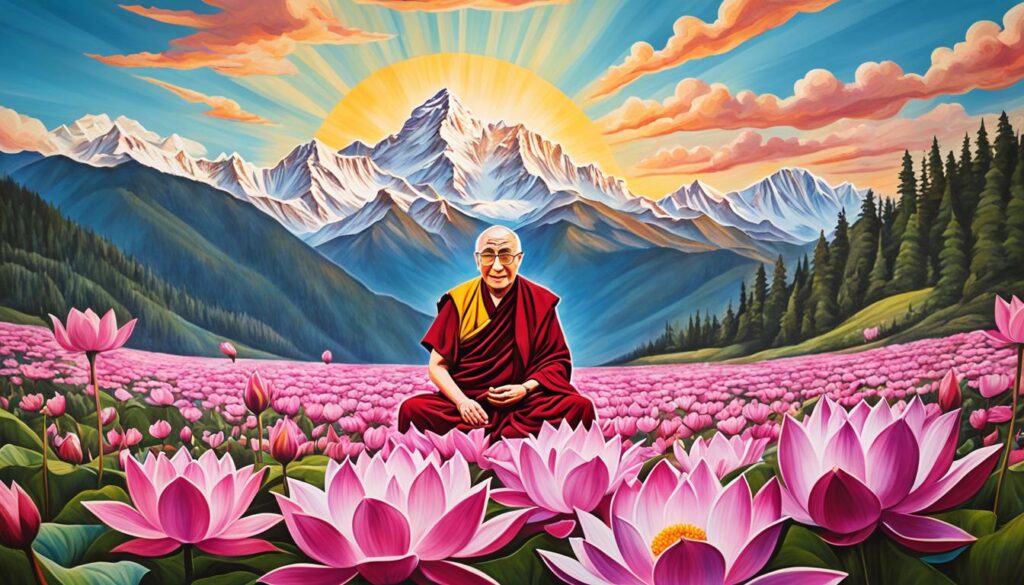Have you ever wondered what it takes to find true peace in our fast-paced, chaotic world? A wise Tibetan spiritual leader, the Dalai Lama, has dedicated his life to advocating for peace and teaching profound insights that can bring harmony and fulfillment to our lives. Through his teachings rooted in Buddhism, the Dalai Lama offers a guiding light to those seeking inner peace and contentment.
Key Takeaways:
- The Dalai Lama’s teachings provide valuable guidance for personal and societal harmony.
- Peace starts with cultivating compassion and inner peace within oneself.
- Kindness and warm-heartedness are the keys to happiness and harmonious relationships.
- Inner peace is cultivated through self-transformation and nurturing mental well-being.
- Compassion is essential for creating a better world and global harmony.
Understanding the Dalai Lama’s Perspective on Peace
The Dalai Lama, widely known as a peace advocate and spiritual leader, offers valuable insights into cultivating peace in our lives and the world around us. His teachings emphasize the importance of compassion, inner peace, and non-violence as fundamental principles for building a harmonious society.
According to the Dalai Lama, true peace begins within oneself. By nurturing compassion and cultivating inner peace, we can create a powerful ripple effect that extends to our families, communities, and beyond. The Dalai Lama encourages us to embrace our own suffering and transform it into an opportunity for positive change.
Non-violence is a cornerstone of the Dalai Lama’s teachings. He believes that it is through peaceful means that we can address conflicts, foster understanding, and build a more peaceful world. By choosing non-violence in our actions and words, we contribute to a cycle of peace that has the potential to transform societies and create lasting harmony.
Through his teachings, the Dalai Lama reminds us that peace is not merely the absence of conflict but a state of mind characterized by compassion, empathy, and understanding. It is through our individual efforts to cultivate inner peace and extend compassion to others that we can create a truly peaceful world.
The Role of Compassion in Peacebuilding
Compassion lies at the heart of the Dalai Lama’s teachings. He believes that compassion serves as a guiding force in promoting peace, both on a personal and global level. When we cultivate compassion, we develop the capacity to empathize with others, understand their suffering, and respond with kindness and love.
By embracing compassion, we bridge divides, foster understanding, and build connections with others. The Dalai Lama envisions a world where compassion is the common language that fosters cooperation, reduces conflicts, and promotes well-being for all. Through acts of compassion, we can contribute to a more equitable and harmonious society.

The Power of Kindness and Warm-Heartedness
The Dalai Lama, known for his profound teachings, believes that the key to happiness lies in cultivating kindness and warm-heartedness towards others. Regardless of our differences, we all share a common desire for happiness. By adopting an attitude of kindness and acceptance, we can build harmonious relationships and find true happiness in our lives.

Kindness is a universal language that transcends cultural boundaries and brings people together. It has the power to transform not only the lives of others but also our own. When we extend kindness to others, we create a ripple effect of positivity and compassion that spreads far beyond the initial act.
Warm-heartedness, on the other hand, goes beyond mere kindness. It is a deep sense of empathy and care that stems from a genuine concern for the well-being of others. When we approach others with warmth and sincerity, we nurture meaningful connections and foster a sense of belonging.
Practicing kindness and warm-heartedness not only brings happiness to those around us but also to ourselves. Scientific studies have shown that acts of kindness activate the pleasure centers in our brains, leading to a sense of joy and fulfillment. Furthermore, acts of kindness have been linked to improved physical and mental well-being, lower stress levels, and increased overall life satisfaction.
Ways to Cultivate Kindness and Warm-Heartedness:
- Show appreciation and gratitude
- Practice random acts of kindness
- Listen attentively and empathetically
- Offer support and help to those in need
- Practice forgiveness and let go of grudges
- Engage in compassionate communication
- Volunteer and contribute to charitable causes
By incorporating these practices into our daily lives, we can cultivate a mindset of kindness and warm-heartedness that brings us closer to the Dalai Lama’s vision of a happier and more compassionate world.
Cultivating Inner Peace and Transformation
According to the Dalai Lama, inner peace is not something that can be acquired externally; it must be cultivated from within. To embark on a journey of self-transformation and discover lasting contentment, the Dalai Lama encourages individuals to transform their minds and embrace the teachings of love, compassion, and patience.
Through self-reflection and mindfulness, you can tap into the immense power within you to foster inner peace and tranquility. By practicing meditation and cultivating awareness, you can navigate through life’s challenges with grace and equanimity.
The Dalai Lama emphasizes that true joy and fulfillment come from nurturing your mental well-being. By aligning your thoughts, words, and actions with kindness and selflessness, you can experience a profound sense of joy and harmony within yourself and the world around you.
Practicing Self-Compassion
One of the key teachings of the Dalai Lama is the importance of self-compassion. It involves treating yourself with the same kindness and understanding that you would extend to others. By acknowledging your own flaws, embracing imperfections, and practicing self-forgiveness, you can cultivate a deep sense of love and acceptance for yourself.
Self-compassion allows you to let go of self-judgment and negative self-talk, creating space for personal growth, healing, and inner peace. It enables you to develop a strong sense of self-worth and resilience, empowering you to face life’s challenges with a calm and compassionate mindset.

Finding Mental Joy in Simple Acts of Kindness
The Dalai Lama teaches us that true happiness can be found in the simplest acts of kindness and selflessness. By extending compassion and genuine care to others, you not only bring joy to their lives but also experience a profound sense of fulfillment and mental joy within yourself.
Each day, strive to perform small acts of kindness, whether it’s offering a helping hand, listening attentively to someone in need, or expressing gratitude towards others. These acts of kindness not only uplift the spirits of those around you but also contribute to your own sense of well-being and inner peace.
Remember, true transformation and lasting happiness begin with a commitment to cultivate inner peace and embrace the teachings of the Dalai Lama. By nurturing your mental well-being, practicing self-compassion, and fostering kindness, you can embark on a transformative journey towards a life filled with inner peace, harmony, and joy.
The Role of Compassion in Creating a Better World
The Dalai Lama strongly believes that compassion is essential for creating a better world. He emphasizes that compassion is not only a religious or philosophical concept but a fundamental aspect of being human. By cultivating compassion, individuals can develop self-confidence, inner strength, and contribute to the well-being of others. The Dalai Lama envisions a world where compassion is the driving force behind actions, leading to global harmony and happiness.
In his teachings, the Dalai Lama emphasizes the importance of extending compassion not only to those who are close to us but also to strangers and even those who may have harmed us in some way. He encourages individuals to see beyond differences and recognize the shared humanity in all beings. This understanding and empathy can lay the foundation for healing divisions and bringing about positive change on a global scale.
Cultivating compassion involves both internal and external practices. Internally, it begins with developing self-compassion and self-care. By nurturing ourselves, acknowledging our own suffering, and treating ourselves with kindness, we can then extend that compassion to others. Externally, compassion manifests through acts of kindness, empathy, and active engagement in social and environmental issues.

“Compassion is not a luxury; it is a necessity for our own peace and mental well-being, as well as the well-being of others,” the Dalai Lama often reminds us. By embracing compassion and actively practicing it in our daily lives, we can contribute to a world where mutual respect, understanding, and empathy prevail.
| Benefits of Compassion | Actions for a Better World |
|---|---|
|
|
Compassion has the power to transform individuals, communities, and the world at large. When we choose compassion over indifference or hostility, we contribute to a more harmonious and inclusive global society.
Conclusion
The teachings of the Dalai Lama provide invaluable insights into finding peace, cultivating compassion, and achieving true happiness. Incorporating these teachings into your life can lead to personal transformation and contribute to creating a more peaceful and compassionate world.
The Dalai Lama’s message of peace and compassion serves as a guiding light for those seeking fulfillment and a life of purpose. By embracing his teachings, you can discover inner tranquility and develop a profound sense of empathy for others.
Through the practice of compassion, you can nurture harmonious relationships and create a ripple effect of positivity. The Dalai Lama encourages you to extend kindness and warm-heartedness to all, recognizing the universal desire for happiness that binds us together.
As you cultivate inner peace and transform your mind, you will discover the joy and fulfillment that comes from acts of love, patience, and selflessness. The teachings of the Dalai Lama remind us that true happiness lies not in external possessions, but in the depth of our thoughts and actions.
Embodying the values of peace, compassion, and happiness can have a profound impact both on an individual level and on society as a whole. By applying the teachings of the Dalai Lama, you become an agent of positive change, contributing to a world that is more peaceful, compassionate, and harmonious.
FAQ
How can the teachings of the Dalai Lama help individuals find peace?
The insights from the Dalai Lama, the Tibetan spiritual leader, emphasize principles such as compassion and mindfulness. By incorporating these teachings into one’s life, individuals can cultivate inner peace and experience personal transformation.
What does the Dalai Lama believe about non-violence?
The Dalai Lama strongly emphasizes the importance of non-violence as a means to build a peaceful world. He believes that peace starts with cultivating compassion and inner peace within oneself.
How can kindness and warm-heartedness contribute to happiness?
The Dalai Lama believes that the key to happiness lies in cultivating kindness and warm-heartedness towards others. By fostering an attitude of kindness and acceptance, individuals can build harmonious relationships and find true happiness in their lives.
How does the Dalai Lama recommend cultivating inner peace?
According to the Dalai Lama, inner peace is not something that can be acquired externally; it must be cultivated from within. He encourages individuals to transform their minds and develop qualities such as love, compassion, and patience. By nurturing mental well-being and finding joy in acts of kindness, individuals can find true joy and fulfillment.
Why does the Dalai Lama emphasize the importance of compassion?
The Dalai Lama strongly believes that compassion is essential for creating a better world. By cultivating compassion, individuals can develop self-confidence, inner strength, and contribute to the well-being of others. Compassion is not just a religious or philosophical concept but a fundamental aspect of being human.
How can the teachings of the Dalai Lama contribute to creating a more peaceful and compassionate world?
The teachings of the Dalai Lama offer invaluable insights into finding peace, cultivating compassion, and achieving true happiness. By incorporating these teachings into our lives, we can experience personal transformation and contribute to creating a more peaceful and compassionate world. The Dalai Lama’s message of peace and compassion serves as a guiding light for individuals seeking fulfillment and a purposeful life.

